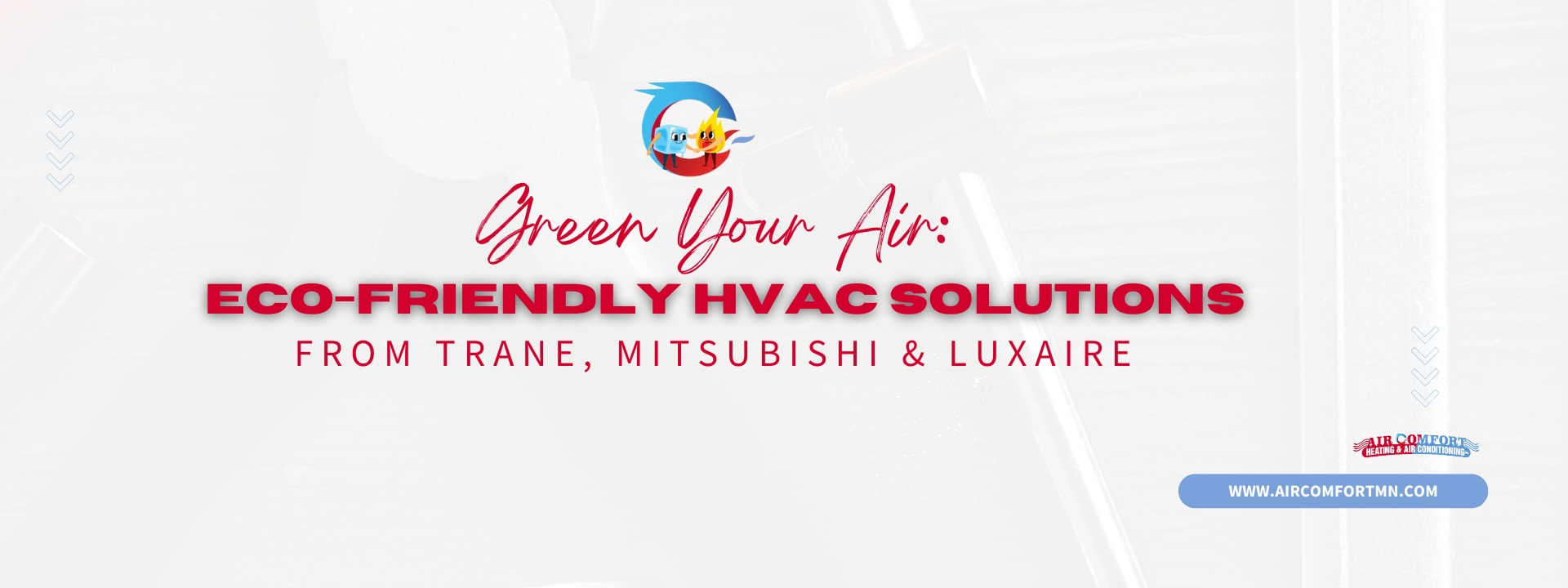|
In the quest for sustainability, every choice in our homes matters, especially when it comes to heating, ventilation, and air conditioning (HVAC) systems. Modern HVAC solutions can play a significant role in reducing your home's environmental impact while enhancing comfort. Let's explore the eco-friendly offerings from leading brands like Trane, Mitsubishi, and Luxaire, and how they contribute to greener living.
Trane: Leading with Efficiency Trane is renowned for its highly efficient HVAC systems that not only provide exceptional comfort but also minimize energy use. Their units often boast high SEER (Seasonal Energy Efficiency Ratio) ratings, which indicate superior energy efficiency. For instance, Trane's XV20i TruComfort™ Variable Speed unit is one of the industry's most efficient air conditioners, utilizing precise variable speed technology to adjust temperatures in small increments. This technology ensures maximum efficiency by reducing electric consumption and emissions, thus promoting a healthier environment. Mitsubishi: Pioneers in Split Systems Mitsubishi Electric has been a frontrunner in the development of ductless mini-split systems, which are ideal for heating and cooling specific zones in your home without the energy losses associated with ductwork. These systems provide enhanced control over the indoor climate and significantly reduce energy consumption by targeting only those areas that are in use. Mitsubishi's split systems feature advanced inverter technology that continuously adjusts compressor speed to meet the demand more efficiently. This capability not only saves energy but also ensures consistent, almost silent operation and prolonged system life. Luxaire: Comfort and Sustainability Luxaire air conditioners and furnaces are designed with both comfort and the environment in mind. These systems exceed governmental energy efficiency standards, which can help homeowners receive energy rebates, reducing the overall cost of installation and operation. Luxaire’s Acclimate™ series, for example, offers some of the highest efficiency ratings in the industry. These units use innovative geothermal technology, among other methods, to deliver effective heating and cooling with a reduced environmental footprint. Benefits of Eco-Friendly HVAC Systems Energy and Cost Savings: High-efficiency systems significantly lower utility bills by reducing energy consumption. Over time, these savings can offset the higher initial cost of purchasing an eco-friendly unit. Reduced Carbon Footprint: By using less energy, these systems generate fewer carbon emissions, aligning your home’s operations with broader environmental sustainability goals. Enhanced Indoor Air Quality: New HVAC technology not only cools and heats your home more efficiently but also improves indoor air quality. Features like advanced filtration and humidity control create a healthier living environment, particularly beneficial for those with allergies or respiratory issues. Choosing the Right System When selecting an HVAC system, consider the size of your home, the typical climate in your area, and specific household needs. Consulting with a professional can ensure that you choose the most appropriate, efficient, and eco-friendly system available. Incentives and Rebates Many governments offer incentives for installing energy-efficient HVAC systems. These can come in the form of rebates, tax credits, or other financial incentives, making eco-friendly options more accessible and affordable. Adopting eco-friendly HVAC solutions is a smart choice for any homeowner looking to reduce energy costs and environmental impact while maintaining year-round comfort. Brands like Trane, Mitsubishi, and Luxaire are leading the way in providing innovative technologies that help sustain our planet. Interested in upgrading to an eco-friendly HVAC system? Contact Air Comfort.
0 Comments
Leave a Reply. |
AuthorVarious. Archives
July 2024
Categories
All
|
CALL NOW: 763-753-6623
Privacy Policy l Cookie Policy l Conditions of Use l Notice and Take Down Policy l Website Accessibility Policy
© 2024 The content on this website is owned by us and our licensors. Do not copy any content (including images) without our consent.
Website managed by Go Savvy Social
Privacy Policy l Cookie Policy l Conditions of Use l Notice and Take Down Policy l Website Accessibility Policy
© 2024 The content on this website is owned by us and our licensors. Do not copy any content (including images) without our consent.
Website managed by Go Savvy Social


 RSS Feed
RSS Feed